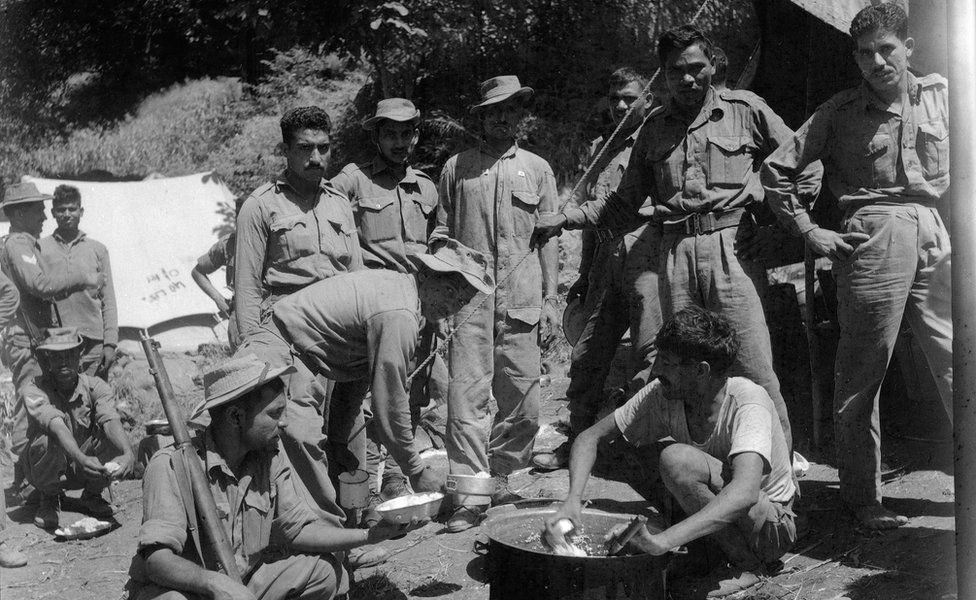India Vs. Pakistan: Is War Over Kashmir Inevitable? Exploring The Historical And Current Tensions

Table of Contents
The Historical Roots of the Kashmir Conflict
The seeds of the Kashmir conflict were sown during the tumultuous partition of India in 1947. The hasty division of the British Raj left the princely state of Kashmir, with its predominantly Muslim population but a Hindu ruler, Maharaja Hari Singh, in a precarious position. This ambiguous status laid the groundwork for the decades-long dispute.
The First Kashmir War (1947-1949)
The First Kashmir War erupted shortly after partition. Fueled by tribal invasions from Pakistan, supported by elements within the Pakistani army, the conflict quickly escalated. Maharaja Hari Singh, facing imminent defeat, acceded to India, triggering a full-scale war.
- Key Battles: The battles of Poonch, Uri, and Srinagar were pivotal in shaping the early stages of the conflict.
- UN Resolutions: The United Nations intervened, resulting in several resolutions calling for a plebiscite to determine the will of the Kashmiri people. However, this plebiscite has never been held.
- Impact on the Line of Control (LoC): The ceasefire line established in 1949, known as the Line of Control (LoC), remains a highly contested and volatile border to this day.
Subsequent Conflicts and Ceasefires
The Kashmir conflict was far from resolved after the first war. Subsequent conflicts erupted in 1965 and 1999, further solidifying the entrenched positions of both India and Pakistan. Attempts at peace, however, have been made.
- Simla Agreement (1972): This agreement, signed after the 1971 war, aimed to improve relations and address the Kashmir issue through bilateral discussions. However, little progress was made on the core issue.
- Lahore Declaration (1999): This declaration, signed by then-Prime Ministers Atal Bihari Vajpayee and Nawaz Sharif, promised to resolve the Kashmir conflict peacefully. However, the subsequent Kargil War undermined these efforts.
- Significance of Agreements and Their Failures: These agreements highlight the recurring attempts at peaceful resolution but also underscore the deep-seated mistrust and the challenges in reaching a lasting settlement.
The Rise of Militancy in Kashmir
The insurgency in Kashmir, beginning in the late 1980s, significantly complicated the situation. Various militant groups, some with alleged links to Pakistan, engaged in armed struggle against Indian rule.
- Major Militant Groups: Groups such as Hizbul Mujahideen and Jaish-e-Mohammed have played prominent roles in the insurgency.
- Impact on Civilian Populations: The conflict has resulted in immense suffering for Kashmiri civilians, caught in the crossfire between militants and security forces.
- Counter-Insurgency Operations: India's counter-insurgency operations have been extensive and often controversial, further exacerbating tensions.
Current Tensions and Political Climate
The Kashmir conflict remains a highly volatile issue, with recent escalations adding to the existing tensions. The current political climate is characterized by deep mistrust and a lack of meaningful dialogue.
The Impact of Cross-Border Terrorism
Accusations of cross-border terrorism continue to fuel the conflict. Both India and Pakistan accuse each other of supporting militant groups operating within their respective territories.
- Specific Incidents of Terrorism: High-profile terrorist attacks, such as the 2008 Mumbai attacks and the 2019 Pulwama attack, have significantly escalated tensions.
- The Role of Intelligence Agencies: The involvement of intelligence agencies from both sides is widely suspected, further complicating the situation.
- Impact on Diplomatic Relations: These accusations severely strain diplomatic relations, making meaningful dialogue increasingly difficult.
The Role of International Actors
International actors, including China, the US, and other significant players, have varying degrees of involvement in the Kashmir conflict.
- International Pressure for Peace: The international community has consistently urged both India and Pakistan to find a peaceful resolution.
- Economic Sanctions: While sanctions have been used in the past, their effectiveness in resolving the conflict remains debated.
- Diplomatic Efforts: Various diplomatic initiatives have been undertaken to mediate between India and Pakistan, though with limited success.
Internal Political Dynamics in India and Pakistan
Domestic political considerations significantly influence both India and Pakistan’s foreign policy regarding Kashmir.
- Nationalist Sentiments: Nationalist sentiments in both countries often hinder compromise and fuel rhetoric against the other.
- Political Opportunism: Political parties in both countries often exploit the Kashmir issue for domestic political gains.
- The Impact of Elections: Elections in both countries can lead to heightened rhetoric and an escalation of tensions.
Is War Inevitable? Assessing the Risks and Potential Outcomes
The potential for further escalation in Kashmir is a grave concern. The consequences of a full-scale war between India and Pakistan would be catastrophic.
Military Buildup and Nuclear Threat
Both India and Pakistan possess significant military capabilities, including nuclear weapons. This nuclear dimension adds an unprecedented layer of risk to the conflict.
- Nuclear Deterrence: The presence of nuclear weapons acts as a deterrent, but it also increases the risk of accidental war or escalation.
- The Potential for Accidental War: Miscalculation or unintended escalation could have devastating consequences.
- The Humanitarian Consequences of Nuclear Conflict: A nuclear war between India and Pakistan would be a humanitarian catastrophe of unimaginable proportions.
Economic and Social Costs of Conflict
Further conflict would have severe economic and social consequences for both India and Pakistan.
- Impact on Trade: Trade between the two countries would likely cease, causing significant economic disruption.
- Impact on Tourism: Tourism, a vital sector in both countries, would be severely impacted.
- Impact on Investment: Foreign investment would likely dry up, hindering economic growth.
- Displacement of Populations: A renewed conflict would lead to widespread displacement and refugee crises.
- Loss of Life: The human cost of conflict would be immense, with countless lives lost and communities devastated.
Alternatives to War: The Path to Peace
Preventing further escalation requires a commitment to dialogue, diplomacy, and addressing the underlying causes of the conflict.
- Dialogue: Sustained and meaningful dialogue between India and Pakistan is crucial.
- Mediation: International mediation could play a vital role in facilitating dialogue and finding common ground.
- Confidence-Building Measures: Steps to build trust and reduce tensions are essential, such as increased communication and cooperation.
- International Involvement: Continued international pressure and engagement are necessary to promote peace.
Conclusion
The India-Pakistan conflict over Kashmir remains a highly volatile and dangerous situation. While a full-scale war is not inevitable, the current tensions and historical context highlight the significant risks involved. Understanding the historical roots of the conflict and the current political dynamics is crucial to finding peaceful resolutions. Continued dialogue, international pressure, and a commitment to addressing the underlying issues are essential to prevent further escalation and strive for a peaceful resolution to the conflict over Kashmir. We must all work towards a future where diplomacy, not war, prevails in the India-Pakistan relationship and the question of Kashmir's future is determined through peaceful means.

Featured Posts
-
 Chkn Mtn Awr Byf Lahwr Myn Gwsht Ky Qymtwn Ka Bhran
May 08, 2025
Chkn Mtn Awr Byf Lahwr Myn Gwsht Ky Qymtwn Ka Bhran
May 08, 2025 -
 Canadas Trade Overtures A Positive Sign For Washington
May 08, 2025
Canadas Trade Overtures A Positive Sign For Washington
May 08, 2025 -
 400 Up And Still Rising Predicting Future Xrp Price Movements
May 08, 2025
400 Up And Still Rising Predicting Future Xrp Price Movements
May 08, 2025 -
 Zielinskis Calf Injury Inter Milan Midfielder Faces Weeks Out
May 08, 2025
Zielinskis Calf Injury Inter Milan Midfielder Faces Weeks Out
May 08, 2025 -
 Ubers Subscription Model Lower Commissions For Drivers
May 08, 2025
Ubers Subscription Model Lower Commissions For Drivers
May 08, 2025
